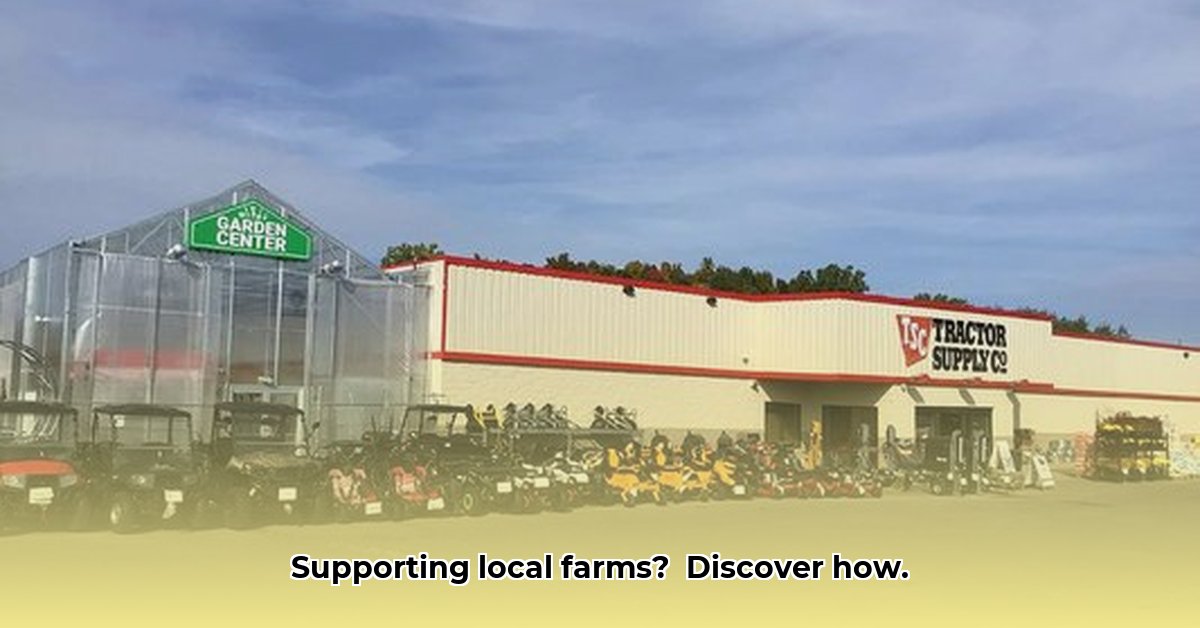
Imlay City's Tractor Supply store serves as a vital hub for the local agricultural community, but its true contribution to sustainable farming practices requires deeper investigation. While its presence is undeniable, a comprehensive assessment necessitates quantifiable data to fully understand its environmental impact and community engagement. This case study aims to illuminate the challenges in evaluating such contributions and proposes a framework for future analyses. For more information on Tractor Supply's operations, see this example store page.
Assessing Tractor Supply's Sustainability Efforts: A Case Study
The Imlay City Tractor Supply store's impact on sustainable agriculture is multifaceted. Simply observing customer traffic and product availability provides an incomplete understanding. To paint a complete picture, we need concrete data on several key aspects: sales figures broken down by product category, energy consumption, waste generation and management practices, and detailed information regarding their supply chain. How many customers are actively purchasing sustainable products? This critical data remains unavailable for this current analysis.
For instance, understanding the percentage of their products sourced from sustainably managed farms is crucial. Similarly, data on energy efficiency measures (e.g., renewable energy utilization, energy-efficient lighting) and waste reduction strategies (e.g., recycling programs, compost initiatives) are essential for a comprehensive evaluation. Without this information, our analysis remains limited to qualitative observations.
Do customers perceive Tractor Supply as a supporter of sustainable agriculture? This would be another important factor to examine.
A key question emerges: How effectively does Tractor Supply in Imlay City integrate sustainability into its operations and support local sustainable farming practices? This requires a robust, data-driven approach.
Key Takeaways:
- A complete assessment of Tractor Supply's sustainability impact requires comprehensive data on sales, energy use, waste management, and supply chain practices.
- The lack of publicly available data on specific sustainability initiatives limits the scope of this initial analysis.
- Further research, including on-site observation, customer surveys, and the incorporation of internal data from Tractor Supply is crucial for a thorough evaluation.
A Framework for Evaluating Sustainability in Rural Retail
To accurately assess the environmental sustainability of a rural retail store like Tractor Supply, a multi-faceted approach is necessary. This framework identifies key areas for investigation:
1. Supply Chain Transparency: The origin and production methods of Tractor Supply's products are key. Do they prioritize sustainable sourcing from local farms and environmentally conscious suppliers? Are certifications (organic, fair trade) clearly indicated? This is crucial for understanding their support of sustainable agriculture. What percentage of Tractor Supply's products are sourced sustainably? (Further research needed).
2. Product Sustainability: The store's inventory reflects its commitment to environmentally sound practices. Do they offer a range of eco-friendly products (e.g., sustainable fertilizers, pest control options)? A diverse catalog of such products would demonstrate a proactive approach to promoting sustainable agriculture. What is the ratio of sustainable to non-sustainable products within their inventory? (Further research needed).
3. Waste Management Practices: Effective waste reduction and recycling programs are essential. This includes evaluating their approach to packaging, waste disposal, and potential composting initiatives. What is their waste diversion rate (percentage of waste recycled or composted)? (Further research needed).
4. Energy Efficiency and Renewable Energy: Analyzing energy consumption and investment in renewable energy sources (e.g., solar power) provides insight into the store's environmental footprint. What is their energy consumption per square foot, and what percentage is sourced from renewable energy? (Further research needed).
5. Community Engagement: A strong commitment to sustainability extends beyond the store's operations to its engagement with the local community. This includes supporting local farmers, participation in sustainable agriculture initiatives, and transparent communication with consumers. What specific community programs does Tractor Supply support? (Further research needed).
Challenges and Future Research
This case study highlights the challenges in evaluating the sustainability performance of a retail store without access to internal data. Securing data on energy consumption, waste generation, and detailed supply chain information would significantly enhance future analyses. Collaborating with Tractor Supply to obtain this data is crucial for a more complete and accurate assessment. Furthermore, incorporating additional qualitative data from stakeholder interviews (farmers, employees, and community residents) would provide valuable insights into their perceived contributions to sustainability. Through a comprehensive data-driven approach, we can more effectively understand the impact of rural retail stores on sustainable agriculture. This will allow for a more effective evaluation of their role in building a stronger, more environmentally conscious rural economy.